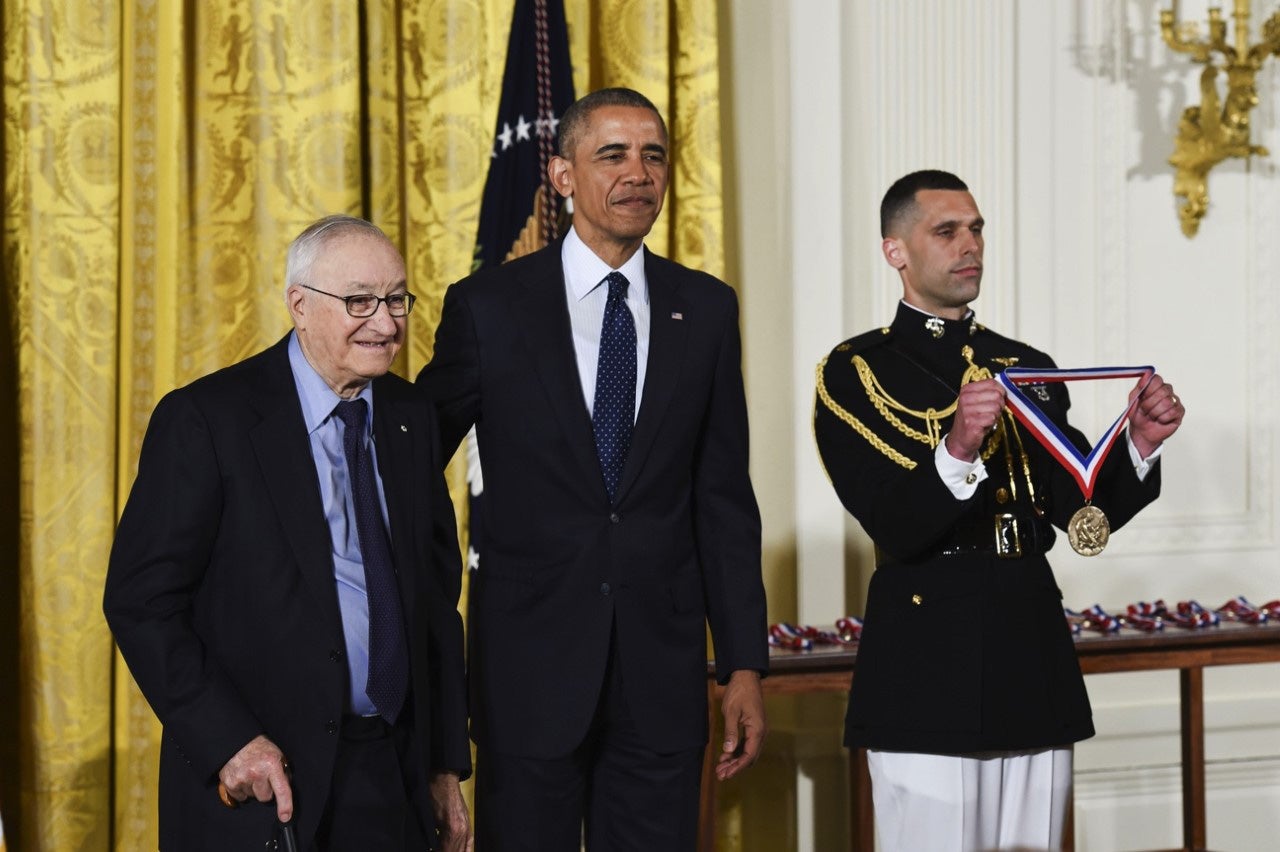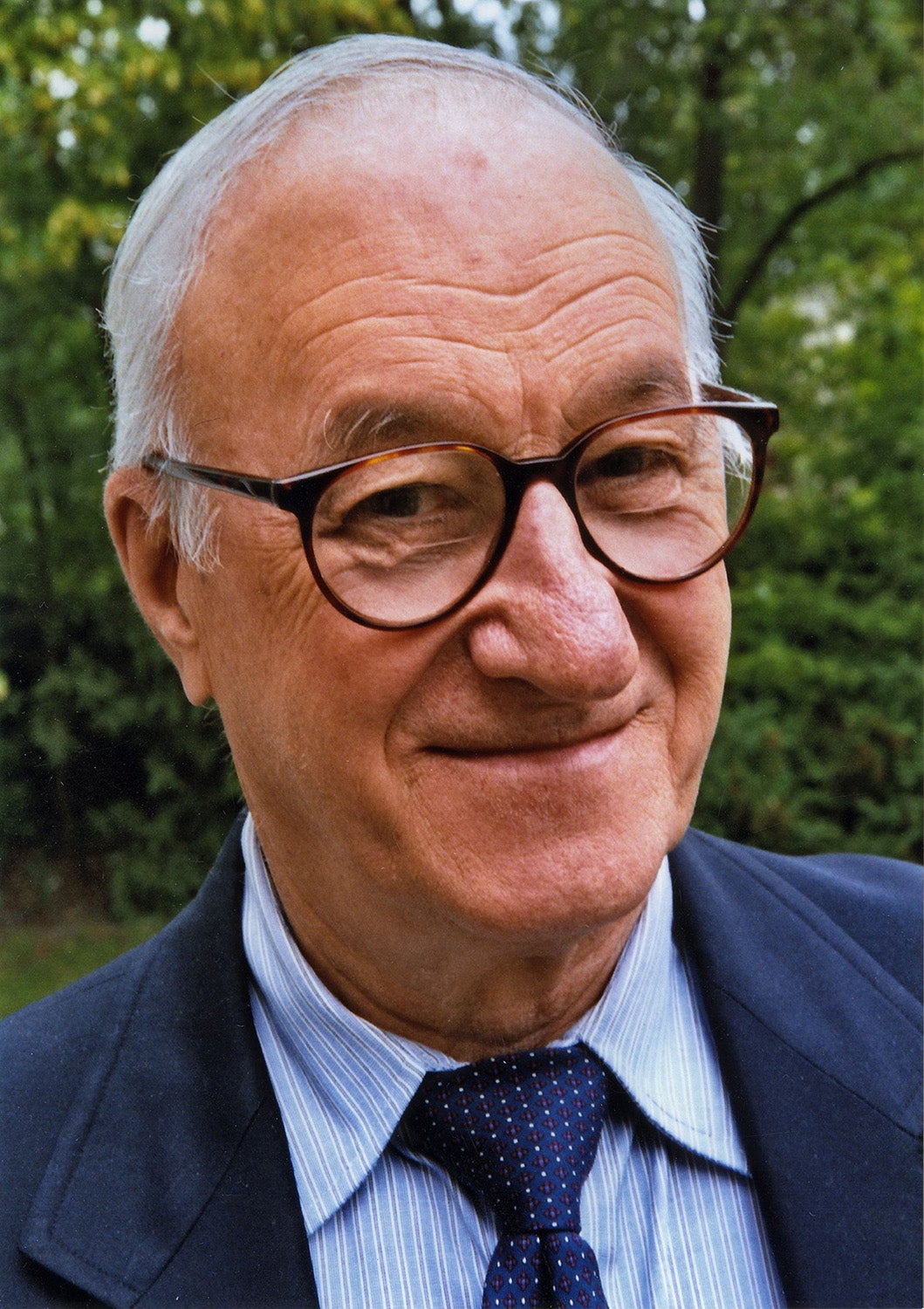Albert “Al” Bandura, the David Starr Jordan Professor of Social Science in Psychology, Emeritus, in the School of Humanities and Sciences (H&S), whose theory of social learning revealed the importance of observing and modeling behaviors, died peacefully in his sleep in his Stanford home on July 26. He was 95.
Bandura is internationally recognized as one of the world’s most influential social psychologists for his groundbreaking research on the importance of learning by observing others. In a 2002 issue of the General Review of Psychology, Bandura was ranked the fourth “most eminent psychologist of the 20th century” behind B. F. Skinner, Jean Piaget and Sigmund Freud.
He is best known for developing social cognitive theory (also known as social learning theory); the concept of self-efficacy – the idea that a person’s belief in their ability to succeed can shape how they think, act and feel; and his Bobo Doll experiments.
“Al Bandura was a giant in the field, whose influence spanned clinical, cognitive, affective and developmental psychology,” said Stanford psychologist Laura Carstensen, the Fairleigh S. Dickinson, Jr. Professor in Public Policy in H&S and the director of the Stanford Center on Longevity.
Bobo Doll experiments
In 1961 Bandura began a series of experiments that became synonymous with his name and defined his early career. In these “Bobo Doll” experiments, children who observed an adult hitting and yelling at an inflatable doll, called Bobo, were more likely to display aggressive behavior toward the doll when playing with it later. The children watched interactions with the doll in person, and (in later experiments) via video with similar results.
The Bobo Doll studies demonstrated that children learn from watching adult behavior and suggested that televised violence can teach and glamorize aggressive behavior. The findings of the experiments upended the established behavioral doctrine that learning was a conditioned response to external punishments and rewards. The results also challenged the prevailing theory that watching violence on television alleviated aggressive impulses in children.
Bandura testified on Capitol Hill with Fred Rogers (of the television show Mr. Rogers’ Neighborhood) on the effects of televised violence on children. As a result, the Federal Trade Commission passed new standards for televised advertising and depictions of children performing certain activities were no longer allowed on television.
Later in his career, Bandura explored other ways his research findings might be applied. He worked with the nonprofit Population Media Center to create programs and telenovelas showing people acting out scenarios related to family planning, social injustice toward women and girls, climate change and protecting against HIV/AIDS. In each scenario, the videos used the findings of Bandura’s research to model positive outcomes.
“The knowledge gained regarding social modeling in the early Bobo Doll experiments … enabled people to change their lives for the better,” Bandura wrote in the book Communication of Innovations (Sage Publications, 2006).
Carol Dweck, the Lewis and Virginia Eaton Professor in H&S, noted that before Bandura’s research, “most work in social development was about reinforcement learning or about direct socialization – what adults did to children to shape them. Al’s work made children active seekers of learning and showed that children actively observe the world and make inferences that guide their future behavior. This was a real turning point – and we are still reaping the benefits of his insights today.”
During his 2012 interview for “Inside the Psychologist’s Studio,” Bandura explained the parallels between his work on self-efficacy and his own experiences. “A good deal of our choices, the most important ones, are often determined by the most trivial of circumstances. … Self-directedness has really served me very well throughout my whole career. In a way my psychological theory is founded on human agency, which means that people have a hand in determining the course their lives take, and in many respects my theory is really a reflection of my life path.”
A scholar and mentor
Over the course of his nearly 57-year research career, Bandura wrote and co-authored hundreds scientific papers and 17 books including including Social Learning Theory (Prentice Hall, 1977); Social Foundations of Thought and Action: A Social Cognitive Theory (Prentice-Hall, 1986); and Moral Disengagement: How People Do Harm and Live with Themselves (Macmillan, 2015).
Bandura received 19 honorary degrees and was elected to the American Academy of Arts and Sciences in 1980. His numerous awards and honors include the Outstanding Lifetime Contribution to Psychology Award from the American Psychological Association, the James McKeen Cattell Award from the American Psychological Society and the Gold Medal Award for Distinguished Lifetime Contribution to Psychological Science from the American Psychological Foundation. In 2014, he was made an Officer of the Order of Canada. In 2016, Bandura was awarded the National Medal of Science by President Barack Obama.

Albert Bandura receives the National Medal of Science from President Barack Obama in a ceremony held at the White House on May 19, 2016. (Image credit: Ryan K. Morris and the National Science & Technology Medals Foundation)
Despite his many achievements, when asked what he was most proud of, Bandura replied that the “knowledge and guidance he passed on to students” around the world was what he treasured most.
Sometimes that guidance came with a side of humor. “I remember him telling me he received an email from a young student who had asked him, ‘Are you still alive?’ Bandura responded, ‘This email is coming from the other side,’ Carstensen said. “I will remember Al as humble and kind, always happy to talk, and invariably generous with his time.”
Given his research on the power of self-efficacy, it’s little surprise that one of Bandura’s most often-cited contributions to the Stanford community was how he inspired faculty and students to believe in themselves and their work.
“He lived his theory of self-efficacy – instilling confidence for successful experiences,” said UCSF pediatrics Professor Elizabeth Ozer, whose project with Bandura became her master’s degree thesis (1988), led to a doctorate (1992) at Stanford, and began a research relationship and friendship that continued until his death. “He was brilliant and prescient at applying theory to the most urgent transdisciplinary challenges facing humankind – such as climate change and the earth’s population – and the importance of the engagement of youth in saving our world. I will so miss my mentor, colleague and friend.”
“Al was such an inspiration to his junior faculty,” said Stanford psychology Professor Jeanne Tsai (’91), the Yumi and Yasunori Kaneko Family University Fellow in Undergraduate Education in H&S and the director of the Stanford Culture and Emotion Lab. “One night, Brian Knutson and I were working very late … wondering why there were no graduate students also working late in the department. We were relieved when we heard a door slam, thinking that there was at least one, but instead, we saw Al, walking out of his office. He was so full of energy and ideas, and he talked to us for another 30 minutes before saying good night.”
From a farm in Canada to “The Farm”
Bandura was born on December 4, 1925, in the immigrant farming community of Mundare in Alberta, Canada. Bandura’s father was Polish, and his mother was from Ukraine. Neither parent spoke English or had a formal education, yet they instilled the love of learning in Albert, the youngest of seven children.
Bandura’s personal life and career path were forged by hard work coupled with a string of serendipitous events. In college he took an introductory psychology class simply because the morning class fit his schedule. Bandura became fascinated with the subject and earned a bachelor’s degree in psychology from the University of British Columbia in Vancouver in 1949, and a master’s degree in psychology in 1951 and a doctorate in clinical psychology in 1952 from the University of Iowa. During his time there, he met Virginia “Ginny” Varns of South Dakota when they happened to cross paths on the golf course. They married in 1952. Bandura joined Stanford’s Department of Psychology in 1953 and was an active faculty member there until he retired in 2010.
Although few people had a window into his private life, family was important to Bandura. “I supervised the PhD thesis of Al’s daughter, Mary,” Dweck said. “Through Mary, I got to know Al in a different way – as not only a great scholar, but also a great father.”
“Bandura was an inspiration for all who were fortunate to know him and his work,” said Tommy Tobin (’10), a mentee and former research assistant. “His contributions to the fields of education, communications and psychology, and to the world more generally, cannot be overstated, as his work has influenced the modern world and countless lives like mine. Not only was Professor Bandura a storied researcher and teacher, he was a mentor and friend whose optimism knew no bounds.”
Karen Saltzman, Bandura’s assistant for the last 10 years of his life, remembered his optimism. “As he would often say: ‘Onward and upward and let the efficacy force be with you,’” she recalled.
Bandura is survived by his daughters, Carol Bandura Cowley and Mary Bandura; and grandchildren, Timothy and Andrew Cowley. In accordance with his wishes, no formal memorial service is being planned. In lieu of flowers or gifts, donations can be made in memory of Albert Bandura’s life and legacy to the Natural Resources Defense Council, the Population Media Center or Young Voices for the Planet.
Media Contacts
Holly Alyssa MacCormick, Stanford School of Humanities and Sciences: hollymac@stanford.edu
